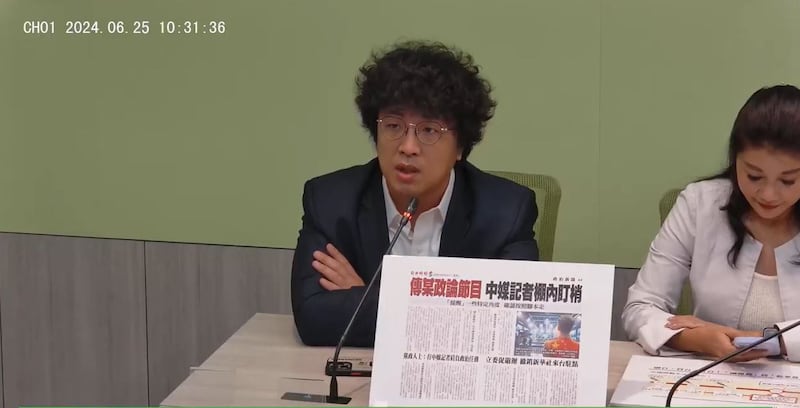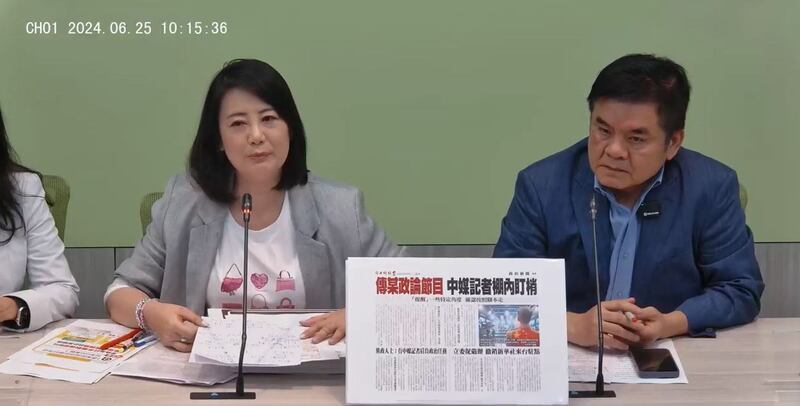Authorities in democratic Taiwan are investigating reports that a journalist from China's state news agency Xinhua played a key role in editing the content of a political talk show at one of the island's TV stations.
Lawmakers in Taiwan warned on Wednesday of ongoing attempts by the Chinese government's propaganda machine to infiltrate Taiwan's media environment, after a newspaper reported on Monday that an unnamed Taiwanese broadcaster had accepted editorial direction from Xinhua correspondent Zhao Bo.
The government's media regulator, the National Communications Commission, said Tuesday it is investigating the allegations, while Mainland Affairs Council Minister Chiu Chui-cheng told lawmakers the same day that a multi-agency investigation would be launched into the allegations made in a report by Taiwan's Liberty Times.
Taiwan is currently ruled as the Republic of China, a sovereign state formed in 1911 after the fall of the Qing Dynasty, and whose Kuomintang government fled to the island from mainland China after losing a civil war with Mao Zedong's communists in 1949.
While Beijing has never ruled out a military invasion to enforce its territorial claim on Taiwan, it has more recently vowed to achieve "peaceful unification" with the island through propaganda and other forms of pressure.
Proposals for new talk shows
The island's Liberty Times reported on June 24 that officials from China's Taiwan Affairs Office had approached several Taiwanese TV stations since the beginning of this year with proposals to start new political talk shows in exchange for preferential commercial treatment in the Chinese market.
Only one accepted, the paper said, adding that Xinhua journalist Zhao Bo took part in all discussions about the show's content, and showed up at the studio as the first episode was being recorded to ensure all the guests followed the agreed scripts.

Zhao also had private conversations with the guests at which she made clear exactly which angles she wanted emphasized, the report said.
The station went on to air a series of shows praising former president Ma Ying-jeou's cross-strait policy during his controversial trip to China in April, which included a meeting with Chinese Communist Party leader Xi Jinping, it said.
Zhao has now left Taiwan after hearing that the news of her activities was starting to spread, the paper reported, adding that Xinhua has sent another journalist to replace her.
Call to revoke credentials
Ruling Democratic Progressive Party lawmaker Wang Ting-yu called on the Taiwan government to revoke the press credentials of Xinhua journalists.
"The government should ban Xinhua News Agency from posting people to Taiwan," Wang said. "Otherwise, if they do something wrong and have to go running back [to China], they can just send someone to replace them, which is a legal loophole."
"Press credentials for Xinhua News Agency correspondents stationed in Taiwan should be immediately revoked," he said.
Lawmaker Rosalia Wu, who heads the Democratic Progressive Party caucus in Taiwan's Legislative Yuan, called on the authorities to investigate the allegations under a law governing relations with China, including its influence operations.
Under Taiwan's Act Governing Relations between the People of the Taiwan Area and the Mainland Area, Taiwanese people or organizations may not engage in any form of cooperation with the Chinese Communist Party, the Chinese government or military that could involve political influence or harm national interests.
"Xinhua News Agency is an official media belonging to the Chinese Communist Party, which makes it equivalent to a Chinese Communist Party government agency," Wu said.
"If Xinhua News Agency is blatantly sending people to monitor Taiwanese media and openly intervene [in their operations], then China is manipulating what gets said in political commentary programs, which is of course illegal," she said.
‘Peaceful unification’
Since Taiwan President Lai Ching-te, Beijing's least-favored candidate, was elected in January, China has been stepping up its use of non-military means including propaganda to achieve what it terms "peaceful unification" with Taiwan, which has never been ruled by the Chinese Communist Party, nor formed part of the People's Republic of China.

Democratic Progressive Party lawmaker Puma Shen said it's likely that the incident involving Zhao Bo isn't an isolated one, and that China has a long history of trying to influence political debate in Taiwan.
"In the past, when they wanted to drive and create public opinion in Taiwan, they would often buy Facebook fans and influencers, but fans and influencers can only reach around 20,000, 30,000 or 100,000 people at most," Shen said.
"Political commentary programs, on the other hand, can reach 500,000 or a million people at a time, so naturally they regard them as the top priority," he said.
Shen warned that the Chinese government also uses Taiwanese "middlemen" to carry out similar operations, which is much harder to detect.
Taiwan Premier Cho Jung-tai told journalists on Tuesday: "We don't know the situation inside the TV station, but any behavior like this should be handled by law enforcement agencies."
China responds
On Wednesday, China's Taiwan Affairs Office dismissed the Liberty Times report as "fake news," and accused the Taiwan government of fabricating concerns over infiltration by Chinese state media.
"They wantonly frame, intimidate and punish media outlets that hold different positions," Office spokesperson Zhu Fenglian told reporters in Beijing, accusing the Democratic Progressive Party of "harming Taiwan and impeding cross-straits relations."
Last week, Beijing issued warnings of prison and even the death penalty for supporters of independence for Taiwan, although the island's government says China has no power to prosecute its people for their opinions.
Zhu said on Wednesday that nobody who “renounced” their pro-independence views would be prosecuted by the Chinese authorities.
Translated by Luisetta Mudie.
